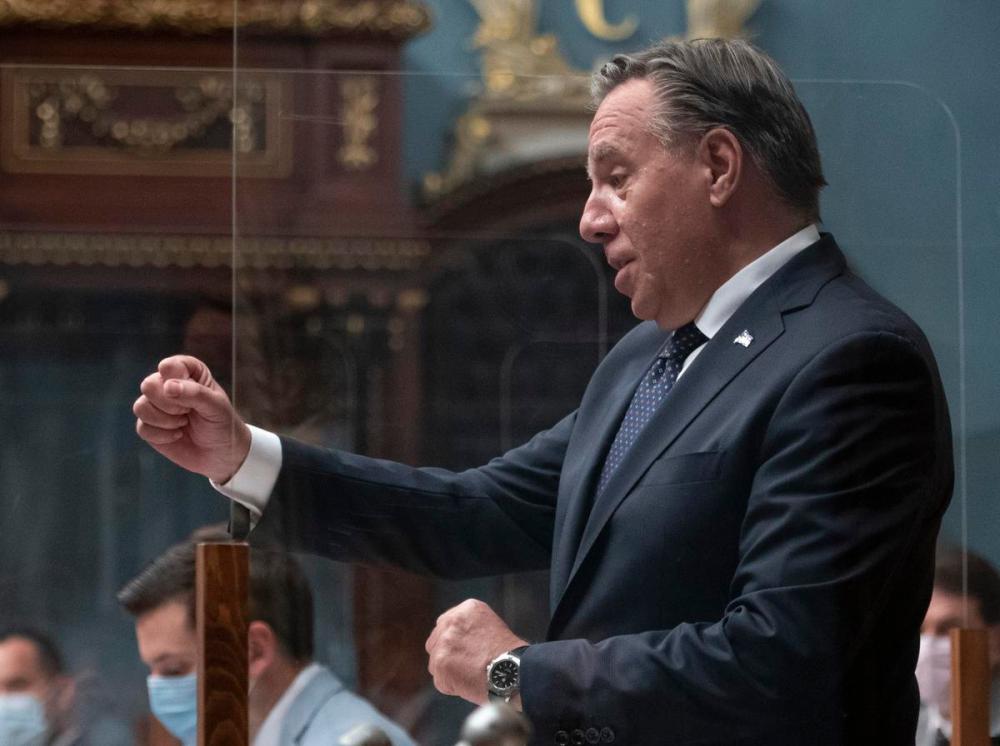The provinces are chipping away at Canada’s Constitution. Why won’t Justin Trudeau say anything?
Advertisement
Read this article for free:
or
Already have an account? Log in here »
To continue reading, please subscribe:
Monthly Digital Subscription
$19 $0 for the first 4 weeks*
- Enjoy unlimited reading on winnipegfreepress.com
- Read the E-Edition, our digital replica newspaper
- Access News Break, our award-winning app
- Play interactive puzzles
*No charge for four weeks then billed as $19 plus GST every four weeks. Offer only available to new and qualified returning subscribers. Cancel any time.
Read unlimited articles for free today:
or
Already have an account? Log in here »
Hey there, time traveller!
This article was published 16/10/2021 (1166 days ago), so information in it may no longer be current.
The constitutional front is heating up. What, if anything, is Prime Minister Justin Trudeau going to do about it?
In Quebec, a major rewrite of the language law is underway.
Included in the package is a bid to unilaterally amend the province’s section of the Constitution to stipulate that French is its only official language and that Quebecers form a nation.

Last spring, in the lead-up to this summer’s election call, Trudeau stated that based on the legal advice secured by his government, Quebec’s move was constitutionally valid.
At the time, neither the New Democrats nor the Conservatives — engaged as they also were in courting Quebec voters — were inclined to query the government further
But beyond that blanket prime ministerial assurance, no specifics were offered as to the potential impact of the change.
Article 133 of the Constitution prescribes the use of English and French in Quebec’s National Assembly, its acts and written materials, and in Quebec courts.
If Premier François Legault’s proposed unilateral amendment does not nullify this and/or other existing sections of the Constitution, how exactly do they cohabit?
Given the past divisive debate over enshrining Quebec’s distinctive character in the Constitution, one might expect a more detailed accounting of the federal government’s legal take on the issue.
And then, on Monday, Albertans will be asked to support a bid by their provincial government to have the principle of equalization removed from the Constitution.
A positive answer will almost certainly not lead to the result officially set out in the question.
There is little impetus outside (or even inside) Alberta for doing away with a system that ensures that when it comes to funding public services, there is a minimally level playing field between richer and poorer provinces.
But a yes vote would still require some form of a federal response.
Premier Jason Kenney’s government argues that a winning plebiscite is a first step on the way to forcing a more Alberta-friendly renegotiation of the equalization formula.
His government wants to use the Supreme Court reference on Quebec secession — and its finding that if a province of the federation secures a clear mandate for independence its partners have a duty to come to the negotiating table — to demand a similar process in the case of its equalization grievances.
Monday’s vote is the first test of the contention that the court’s finding extends to constitutional matters other than secession.
The same court reference also prescribes a clear majority as the threshold to trigger a negotiation.
On that basis, Trudeau has always argued that it would take more than a simple majority for a Liberal federal government to act on a yes vote to Quebec secession.
In this, the prime minister stands alone among the leaders of the main federal parties.
Faced with a narrow yes victory in Alberta’s equalization referendum, would Trudeau use that argument to dismiss the result? And if so, would the opposition majority — made up as it is of parties that have defended the 50-per-cent-plus-one rule — go to the barricades on behalf of Alberta?
So far, the NDP and the Conservatives have steered as clear as possible from Monday’s plebiscite.
The issue put to Albertans is not of the same magnitude as Quebec’s secession bid.
The very format of the referendum — it is tagged onto the municipal ballot alongside a question about scrapping daylight saving time — speaks to that reality.
The turnout in municipal elections is notoriously low. Whatever the answer on Monday, that stands to greatly lessen the political weight of the result.
All that being said, the concept of equalization is a fundamental part of the fabric of the federation. To have the provincial government of a larger province attempt to mobilize its voters against its continued existence is anything but a non-event.
At the same time, under their current governments, Ontario and Quebec have over the recent past both taken to sheltering pieces of legislation — dealing with minority language and religious rights and third-party election spending — from the Charter of Rights and Freedoms and the reach of the courts. A recourse that was long considered exceptional is in the process of being normalized.
Even as he knows he has close to zero chance to secure the support required to remove the principle of equalization from the Constitution. Kenney still seeks to galvanize his voters against it for his own leverage purposes.
Legault — as part of his autonomous agenda — is testing his province’s capacity to go it alone on setting its own constitutional terms.
Premier Doug Ford has found it expedient to use the notwithstanding clause to suspend the application of a court ruling his government did not like.
If any of them were looking for further encouragement to push the constitutional envelope, they would have found it in the increasingly deafening silence of Canada’s federal political class.
Chantal Hébert is an Ottawa-based freelance contributing columnist covering politics for the Star. Reach her via email: chantalh28@gmail.com or follow her on Twitter: @ChantalHbert


